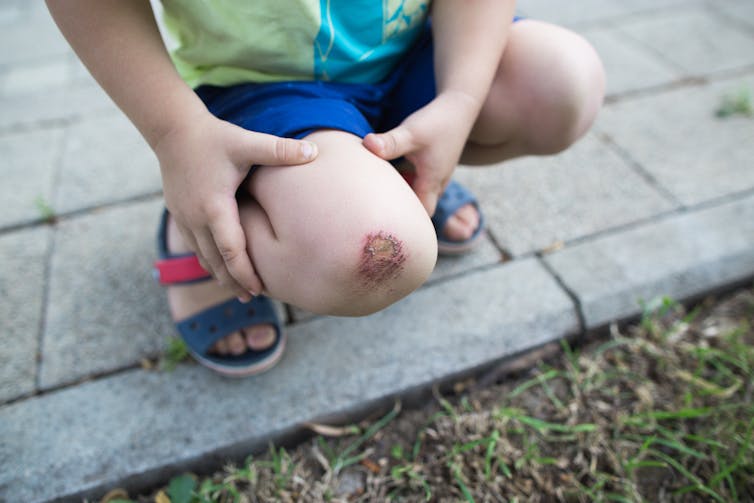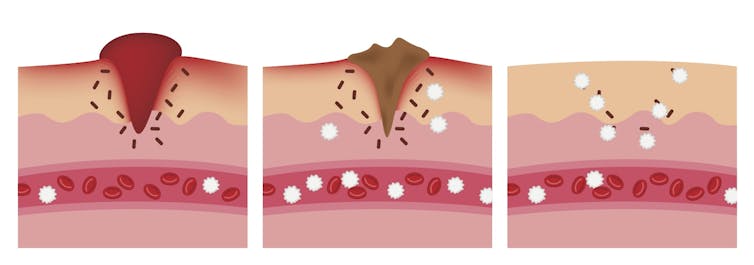Curious Kids: how do wounds heal?
- Written by Christina Parker, Senior Lecturer, Queensland University of Technology
 If you have a question you’d like an expert to answer, send it to curiouskids@theconversation.edu.au.
I would like to know how wounds heal. – Simon, age 7.
Thank you for this excellent question, Simon. To explain how the body heals a break in the skin, I first need to explain a bit about how skin works.
Did you know the skin is the largest organ in the body? It has three layers that protect us from germs and help our body keep the right temperature. For example, when our body gets too hot, we have sweat glands in the skin that release salty water to cool us down (it’s like air conditioning in our bodies). Our skin also has a lot of sensors so we can touch and feel hot and cold.
Read more:
Curious Kids: how does our blood fight viruses like chicken pox and colds?
Plugging the wound
Once we get a wound, the first thing the body tries to do is stop the bleeding.
Within minutes or even seconds, tiny things in your blood called “blood cells” start to group together, protecting and plugging up the wound to stop any more bleeding. A scab will start to form.
The body tries to plug up the wound as quick as it can. It wants to stop germs getting in through broken skin and making you really sick. But even as this happens, the wound may let out a bit of clear fluid that helps to clean the wound.
Your doctor may also decide to close your wound with stitches, special glue or staples to keep the skin together until the body has built new skin to heal.
If you have a question you’d like an expert to answer, send it to curiouskids@theconversation.edu.au.
I would like to know how wounds heal. – Simon, age 7.
Thank you for this excellent question, Simon. To explain how the body heals a break in the skin, I first need to explain a bit about how skin works.
Did you know the skin is the largest organ in the body? It has three layers that protect us from germs and help our body keep the right temperature. For example, when our body gets too hot, we have sweat glands in the skin that release salty water to cool us down (it’s like air conditioning in our bodies). Our skin also has a lot of sensors so we can touch and feel hot and cold.
Read more:
Curious Kids: how does our blood fight viruses like chicken pox and colds?
Plugging the wound
Once we get a wound, the first thing the body tries to do is stop the bleeding.
Within minutes or even seconds, tiny things in your blood called “blood cells” start to group together, protecting and plugging up the wound to stop any more bleeding. A scab will start to form.
The body tries to plug up the wound as quick as it can. It wants to stop germs getting in through broken skin and making you really sick. But even as this happens, the wound may let out a bit of clear fluid that helps to clean the wound.
Your doctor may also decide to close your wound with stitches, special glue or staples to keep the skin together until the body has built new skin to heal.
 Scabs help keep germs out.
Shutterstock
Behind the scenes
Under the skin, your body is hard at work cleaning and fixing.
The wound may be swollen, red and painful. Doctors call this “inflammation”. Swelling like this means the body is sending more fluid, oxygen and blood cells to the wound to get to work fixing it.
In your blood there are special “soldier” cells in charge of fighting germs. They are called white blood cells, and as soon as you get a cut, your body will send a lot of white blood cells to the wound to get to work. They eat any germs that may have come in when your skin was broken and they also guide the healing process.
The blood cells in the body then work to start building new skin, layer by layer. One thing they do is tell the body to start producing more of a chemical called “collagen” which helps the skin form new layers.
It usually takes a few days for a wound to heal fully, but it sometimes takes much longer. If you get a really big wound, you might get a scar. A scar is also made out of collagen. It is a mark on your skin. Sometimes they stay there forever, and sometimes they disappear or get lighter over time.
Scabs help keep germs out.
Shutterstock
Behind the scenes
Under the skin, your body is hard at work cleaning and fixing.
The wound may be swollen, red and painful. Doctors call this “inflammation”. Swelling like this means the body is sending more fluid, oxygen and blood cells to the wound to get to work fixing it.
In your blood there are special “soldier” cells in charge of fighting germs. They are called white blood cells, and as soon as you get a cut, your body will send a lot of white blood cells to the wound to get to work. They eat any germs that may have come in when your skin was broken and they also guide the healing process.
The blood cells in the body then work to start building new skin, layer by layer. One thing they do is tell the body to start producing more of a chemical called “collagen” which helps the skin form new layers.
It usually takes a few days for a wound to heal fully, but it sometimes takes much longer. If you get a really big wound, you might get a scar. A scar is also made out of collagen. It is a mark on your skin. Sometimes they stay there forever, and sometimes they disappear or get lighter over time.
 White blood cells will eat any germs that may have come in when your skin was broken.
Shutterstock
How to help your body fix a wound
It is important to keep the wound clean, damp and covered to help it heal quicker. Wounds that are left uncovered are likely to dry out and are not protected from other injuries.
If your wound creates a scab, it might get really itchy. But try not to scratch! Your skin is busy healing underneath. Just let it fall off on its own. Band-aids are perfect to protect small wounds from further injury.
You should eat healthy food to help fuel your body while it fixes itself. Your body needs protein (like meat, milk and cheese), carbohydrates (like bread and pasta) and vitamins (like oranges, carrots and spinach).
These foods supply energy for healing your wound, and help your immune system fight germs.
Read more:
Curious Kids: why do we have two kidneys when we can live with only one?
Hello, curious kids! Have you got a question you’d like an expert to answer? Ask an adult to send your question to curiouskids@theconversation.edu.au
White blood cells will eat any germs that may have come in when your skin was broken.
Shutterstock
How to help your body fix a wound
It is important to keep the wound clean, damp and covered to help it heal quicker. Wounds that are left uncovered are likely to dry out and are not protected from other injuries.
If your wound creates a scab, it might get really itchy. But try not to scratch! Your skin is busy healing underneath. Just let it fall off on its own. Band-aids are perfect to protect small wounds from further injury.
You should eat healthy food to help fuel your body while it fixes itself. Your body needs protein (like meat, milk and cheese), carbohydrates (like bread and pasta) and vitamins (like oranges, carrots and spinach).
These foods supply energy for healing your wound, and help your immune system fight germs.
Read more:
Curious Kids: why do we have two kidneys when we can live with only one?
Hello, curious kids! Have you got a question you’d like an expert to answer? Ask an adult to send your question to curiouskids@theconversation.edu.au
 CC BY-ND
Please tell us your name, age and which city you live in. We won’t be able to answer every question but we will do our best.
CC BY-ND
Please tell us your name, age and which city you live in. We won’t be able to answer every question but we will do our best.
Authors: Christina Parker, Senior Lecturer, Queensland University of Technology
Read more http://theconversation.com/curious-kids-how-do-wounds-heal-118603



















